通用版小学英语小升初专题复习语法综合-- 一般现在时 课件(共24张PPT)
文档属性
| 名称 | 通用版小学英语小升初专题复习语法综合-- 一般现在时 课件(共24张PPT) | 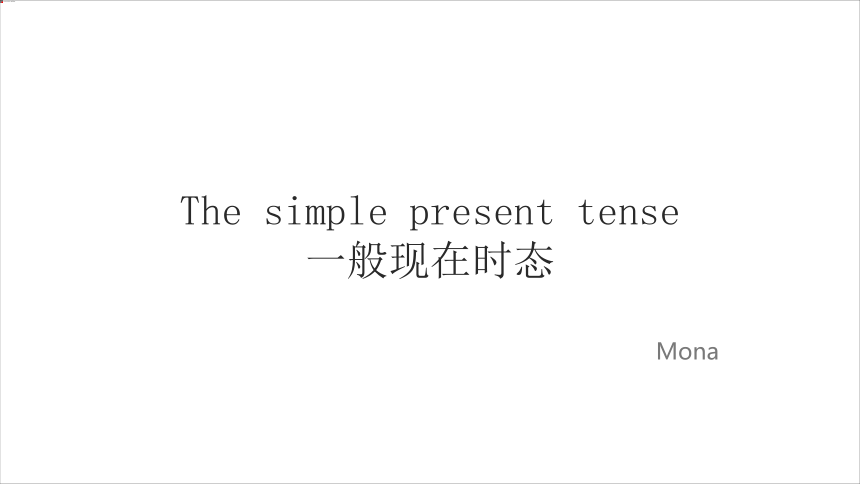 | |
| 格式 | pptx | ||
| 文件大小 | 448.1KB | ||
| 资源类型 | 试卷 | ||
| 版本资源 | 通用版 | ||
| 科目 | 英语 | ||
| 更新时间 | 2023-01-11 15:35:31 | ||
图片预览



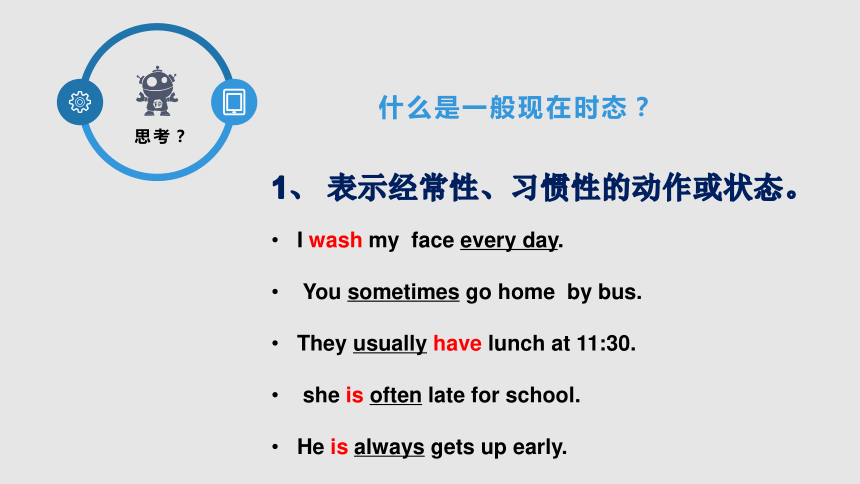
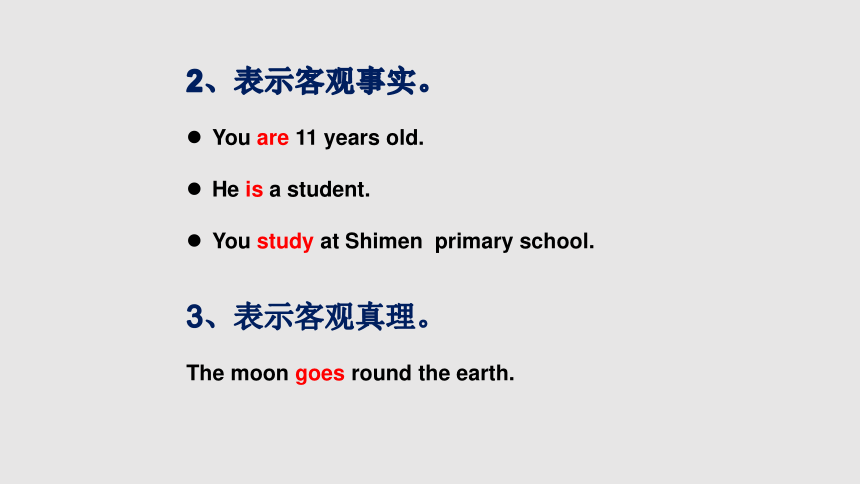

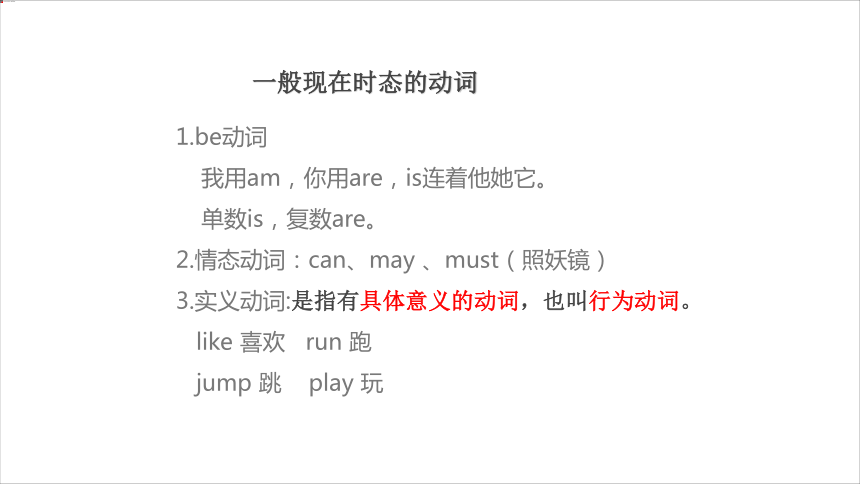

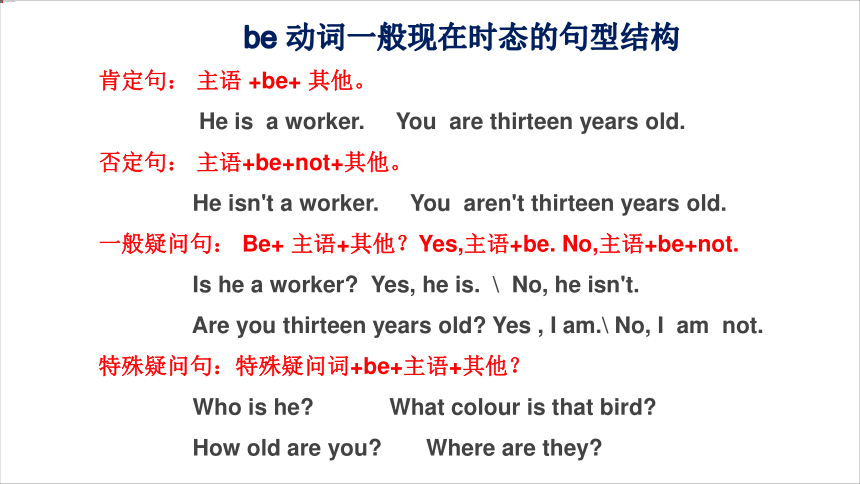
文档简介
(共24张PPT)
The simple present tense
一般现在时态
Mona
目
录
壹
一般现在时的定义
贰
一般现在时态的动词
叁
句型结构
肆
一般现在时练习题
一般现在时定义
Lorem ipsum dolor sit amet, consectetuer adipiscing elit. Maecenas porttitor
壹
什么是一般现在时态?
思考?
1、 表示经常性、习惯性的动作或状态。
I wash my face every day.
You sometimes go home by bus.
They usually have lunch at 11:30.
she is often late for school.
He is always gets up early.
2、表示客观事实。
You are 11 years old.
He is a student.
You study at Shimen primary school.
3、表示客观真理。
The moon goes round the earth.
关于一般现在时态的动词
壹
1.be动词
我用am,你用are,is连着他她它。
单数is,复数are。
2.情态动词:can、may 、must(照妖镜)
3.实义动词:是指有具体意义的动词,也叫行为动词。
like 喜欢 run 跑
jump 跳 play 玩
一般现在时态的动词
句型结构
壹
be 动词一般现在时态的句型结构
肯定句: 主语 +be+ 其他。
He is a worker. You are thirteen years old.
否定句: 主语+be+not+其他。
He isn't a worker. You aren't thirteen years old.
一般疑问句: Be+ 主语+其他?Yes,主语+be. No,主语+be+not.
Is he a worker Yes, he is. \ No, he isn't.
Are you thirteen years old Yes , I am.\ No, I am not.
特殊疑问句:特殊疑问词+be+主语+其他?
Who is he What colour is that bird
How old are you Where are they
有关情态动词(can)的句型结构
肯定句: 主语 + can + V.(原)+其他。
I can draw. He can sing a song.
否定句: 主语 + can + not + V.(原)+其他。
I can not draw. He can not sing a song.
一般疑问句: Can + 主语 + V.(原) +其他?
Yes,主语 + can.
No,主语 + can't.
Can you draw Yes,I can. No,I can't.
Can he sing a song Yes,he can. No,he can't.
特殊疑问句:特殊疑问词+can+主语+V.(原)+其他?
What can you do
Where can he go
01
02
动词原形
动词的第三人称单数
实义动词
一般现在时态的句型结构---实义动词
主语+ +其他。
动词原形
动词单三
We study English.
He reads books in the room.
人称 主格 宾格 形容词性物主代词 名词性物主代词
第一人称 I 我 me 我 my 我的 mine 我的…
we 我们 us 我们 our 我们的 ours 我们的…
第二人称 you 你 you 你 your 你的 yours 你的…
you 你们 you 你们 your 你们的 yours 你们的…
第三人称 he 他 him 他 his 他的 his 他的…
she 她 her 她 her 她的 hers 她的…
it 它 it 它 its 它的 its 它的…
they 它/他/她们 them 它/他/她们 their 它/他/她们的 theirs
它/他/她们的…
动词 “单三” 的变化规则
一般情况,词尾+s walk---walks
play---plays
以 s\ sh \ch\ x 结尾的单词,在词尾+es watch---watches
以 “辅音字母+y”结尾单词,把y 变i ,再加es fly---flies
study---studies
特殊情况 have---has
go---goes
do---does
主语为第三人称单数,动词要按规则加s或es
Ex2: 写出下列动词的单三形式。
look_______ go______ give_______ fly_______ have_______
get _____ brush______ cook ______ make______ wash_____
looks
goes
gives
flies
has
Ex1:判断主语是否是第三人称单数
a panda_____ they______ this book______
these cats_____ Mike_______ Han Mei________
Beijing______ Uncle Wang______ she_______
√
×
√
√
√
√
√
√
×
gets
brushes
cooks
makes
washes
否定句:主语+don't \doesn't+ 动词原形+其他。
I don't stay at home on Saturday.
Lucy doesn't read books in the room.
主语+动词原形+其它。
主语+动词三单+其它。
肯定句:主语+实义动词+其它。
句型结构
将下列各句改为否定句。
I talk to Peter because I like him.
2. Kate comes from American. Kate works with Peter.
3. I am a student.
4. They know each other.
I don't talk to Peter because I don't like him.
Kate doesn't come from American.
Kate doesn't work with Peter.
I am not a student.
They don't know each other.
一般疑问句:
① Do + 主语 + V.(原) + 其它?
Yes,主语 + do.
No,主语 + don't.
We draw a picture.
Do you draw a picture Yes,we do. No,we don't.
② Does + 主语+ V.(原) + 其它?
Yes,主语 + does.
No,主语 + doesn't.
He draws a picture.
Does he draw a picture Yes,he does. No,he doesn't.
句型结构
把下列句子改写成否定句和一般疑问句。
The sun rises in the east.
否定句:
一般疑问句:
2、Tom plays football in the afternoon.
否定句:
一般疑问句:
3、They live in Shanghai.
否定句:
一般疑问句:
The sun doesn't rise in the east.
Does the sun rise in the east
Tom doesn't play football in the afternoon.
Does Tom play football in the afternoon
They don't live in Shanghai.
Do they live in Shanghai
特殊疑问句
特殊疑问词+do\does+主语+动词原形+其他?
1、时间 when
He goes to school at seven.
When does he go to school
2、地点 where
Children have lunch at school.
Where do children have lunch
3、(交通)方式,(身体)状况 how
We go to school by bus.
How do you go to school
I am fine.
How are you
改写句子
Tom goes to school by bike every day.
就 Tom 提问
就 goes to school 提问
就 by bike 提问
____ goes to school by bike every day
______ does Tom do by bike every day
_______ does Tom go to school every day
Who
What
How
改写句子
She comes from America.
否定句
就 she 提问
就 America 提问
She________come from America.
______ comes from America
______ does she come from
doesn’t
Who
Where
“every一家”
every night 每天晚上
every week 每周
every month每月
其他
in the morning在早上
in the afternoon在下午
in the evening 在晚上
once a week 一周一次
twice a month 一月两次
three times a day一天三次
“频率副词一家”
always\often\sometimes
总是 经常 有时usually\seldom\never
通常 很少 从不
时间标志词(时间状语)
The simple present tense
一般现在时态
Mona
目
录
壹
一般现在时的定义
贰
一般现在时态的动词
叁
句型结构
肆
一般现在时练习题
一般现在时定义
Lorem ipsum dolor sit amet, consectetuer adipiscing elit. Maecenas porttitor
壹
什么是一般现在时态?
思考?
1、 表示经常性、习惯性的动作或状态。
I wash my face every day.
You sometimes go home by bus.
They usually have lunch at 11:30.
she is often late for school.
He is always gets up early.
2、表示客观事实。
You are 11 years old.
He is a student.
You study at Shimen primary school.
3、表示客观真理。
The moon goes round the earth.
关于一般现在时态的动词
壹
1.be动词
我用am,你用are,is连着他她它。
单数is,复数are。
2.情态动词:can、may 、must(照妖镜)
3.实义动词:是指有具体意义的动词,也叫行为动词。
like 喜欢 run 跑
jump 跳 play 玩
一般现在时态的动词
句型结构
壹
be 动词一般现在时态的句型结构
肯定句: 主语 +be+ 其他。
He is a worker. You are thirteen years old.
否定句: 主语+be+not+其他。
He isn't a worker. You aren't thirteen years old.
一般疑问句: Be+ 主语+其他?Yes,主语+be. No,主语+be+not.
Is he a worker Yes, he is. \ No, he isn't.
Are you thirteen years old Yes , I am.\ No, I am not.
特殊疑问句:特殊疑问词+be+主语+其他?
Who is he What colour is that bird
How old are you Where are they
有关情态动词(can)的句型结构
肯定句: 主语 + can + V.(原)+其他。
I can draw. He can sing a song.
否定句: 主语 + can + not + V.(原)+其他。
I can not draw. He can not sing a song.
一般疑问句: Can + 主语 + V.(原) +其他?
Yes,主语 + can.
No,主语 + can't.
Can you draw Yes,I can. No,I can't.
Can he sing a song Yes,he can. No,he can't.
特殊疑问句:特殊疑问词+can+主语+V.(原)+其他?
What can you do
Where can he go
01
02
动词原形
动词的第三人称单数
实义动词
一般现在时态的句型结构---实义动词
主语+ +其他。
动词原形
动词单三
We study English.
He reads books in the room.
人称 主格 宾格 形容词性物主代词 名词性物主代词
第一人称 I 我 me 我 my 我的 mine 我的…
we 我们 us 我们 our 我们的 ours 我们的…
第二人称 you 你 you 你 your 你的 yours 你的…
you 你们 you 你们 your 你们的 yours 你们的…
第三人称 he 他 him 他 his 他的 his 他的…
she 她 her 她 her 她的 hers 她的…
it 它 it 它 its 它的 its 它的…
they 它/他/她们 them 它/他/她们 their 它/他/她们的 theirs
它/他/她们的…
动词 “单三” 的变化规则
一般情况,词尾+s walk---walks
play---plays
以 s\ sh \ch\ x 结尾的单词,在词尾+es watch---watches
以 “辅音字母+y”结尾单词,把y 变i ,再加es fly---flies
study---studies
特殊情况 have---has
go---goes
do---does
主语为第三人称单数,动词要按规则加s或es
Ex2: 写出下列动词的单三形式。
look_______ go______ give_______ fly_______ have_______
get _____ brush______ cook ______ make______ wash_____
looks
goes
gives
flies
has
Ex1:判断主语是否是第三人称单数
a panda_____ they______ this book______
these cats_____ Mike_______ Han Mei________
Beijing______ Uncle Wang______ she_______
√
×
√
√
√
√
√
√
×
gets
brushes
cooks
makes
washes
否定句:主语+don't \doesn't+ 动词原形+其他。
I don't stay at home on Saturday.
Lucy doesn't read books in the room.
主语+动词原形+其它。
主语+动词三单+其它。
肯定句:主语+实义动词+其它。
句型结构
将下列各句改为否定句。
I talk to Peter because I like him.
2. Kate comes from American. Kate works with Peter.
3. I am a student.
4. They know each other.
I don't talk to Peter because I don't like him.
Kate doesn't come from American.
Kate doesn't work with Peter.
I am not a student.
They don't know each other.
一般疑问句:
① Do + 主语 + V.(原) + 其它?
Yes,主语 + do.
No,主语 + don't.
We draw a picture.
Do you draw a picture Yes,we do. No,we don't.
② Does + 主语+ V.(原) + 其它?
Yes,主语 + does.
No,主语 + doesn't.
He draws a picture.
Does he draw a picture Yes,he does. No,he doesn't.
句型结构
把下列句子改写成否定句和一般疑问句。
The sun rises in the east.
否定句:
一般疑问句:
2、Tom plays football in the afternoon.
否定句:
一般疑问句:
3、They live in Shanghai.
否定句:
一般疑问句:
The sun doesn't rise in the east.
Does the sun rise in the east
Tom doesn't play football in the afternoon.
Does Tom play football in the afternoon
They don't live in Shanghai.
Do they live in Shanghai
特殊疑问句
特殊疑问词+do\does+主语+动词原形+其他?
1、时间 when
He goes to school at seven.
When does he go to school
2、地点 where
Children have lunch at school.
Where do children have lunch
3、(交通)方式,(身体)状况 how
We go to school by bus.
How do you go to school
I am fine.
How are you
改写句子
Tom goes to school by bike every day.
就 Tom 提问
就 goes to school 提问
就 by bike 提问
____ goes to school by bike every day
______ does Tom do by bike every day
_______ does Tom go to school every day
Who
What
How
改写句子
She comes from America.
否定句
就 she 提问
就 America 提问
She________come from America.
______ comes from America
______ does she come from
doesn’t
Who
Where
“every一家”
every night 每天晚上
every week 每周
every month每月
其他
in the morning在早上
in the afternoon在下午
in the evening 在晚上
once a week 一周一次
twice a month 一月两次
three times a day一天三次
“频率副词一家”
always\often\sometimes
总是 经常 有时usually\seldom\never
通常 很少 从不
时间标志词(时间状语)
